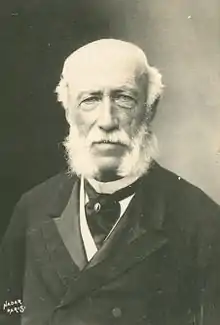Georg Herbert Münster
Georg Herbert Fürst[1] zu Münster von Derneburg (23 December 1820 – 28 March 1902),[2][3] also known by his earlier title of Count of Münster-Ledenburg, was a Hanoverian and later German diplomat and politician. He served as ambassador to London 1873–1885[4] and Paris (1885–1900).

Early life and education
Münster was born in London, where his father, Ernst zu Münster, was the Hanoverian Minister at the Court of King George IV. He studied law at the universities of Bonn, Heidelberg, and Göttingen. At 18, he inherited the family's considerable estate and hereditary seat in the Hanoverian parliament, the Estates Assembly of the Kingdom of Hanover.[2] He also followed his father into the Hanoverian diplomatic service.[3]
Career
From his father, Münster inherited strong Guelph sympathies and conservative viewpoints.[2][3] During the German revolutions of 1848–49, he opposed reforms and the abolition of privileges for the nobility, and he voted against giving the Hanoverian National Assembly to right to pass laws for Hanover.[2] During the early years of his own career, these family traditions kept him closely attached to the Hanoverian dynasty. Prom 1856–64, he was the Hanoverian Minister in Saint Petersburg, the same post his father had held 50 years prior.[3] In 1866, Münster tried and failed via diplomatic channels to bring understanding between Hanover and Prussia, and the latter annexed the former as a result of the Austro-Prussian War.[3]
His subsequent rise in the Prussian diplomatic service was met with reproach by the Guelphs, but Münster was convinced that Germany could only be saved by strong Prussian leadership. "My conception of a true Hanoverian," he wrote, "is that he must be first of all a German." Münster represented the town of Goslar in the Reichstag from 1867–73, when he was appointed by Otto von Bismarck to succeed Albrecht von Bernstorff at the Court of St James's.[3]
Münster spent the next 28 years in London and Paris, and Münster contributed substantially to smoothing over many minor conflicts between France and Germany. He represented the German Empire at the 1889 Hague Convention, after which he received the title of Prince. In 1900, he was awarded the Order of the Black Eagle. In December 1901, he retired to his villa in Hanover.[3]
Personal life
Münster was twice married.[3] In 1847, he married Alexandra, Dowager Princess Dolgorukova (1823–84), widow of Dmitry Nikolaevich Dolgorukov; née Princess Golitsyn, daughter of Prince Mikhail Mikhailovich Golitsyn (1793–1856). Their son was Alexander Münster.[2]
He married secondly, at Dysart House in 1865, to Lady Elizabeth St Clair-Erskine, daughter of the 3rd Earl of Rosslyn.[2]
He died in Hanover.[3]
References
| Wikimedia Commons has media related to Georg Herbert zu Münster. |
- Regarding personal names: Fürst is a title, translated as Prince, not a first or middle name. The feminine form is Fürstin.
- "Münster von Derneburg, Georg Fürst". Neue Deutsche Biographie (in German). 18: 535–537. 1997. Retrieved 11 November 2018.
- "Death of Prince Münster". The Times. The Times Digital Archive. 31 March 1902. p. 8.
- "Prince von Munster". Kalgoorlie Miner, 9 October 1899, p. 2. Retrieved from Trove, 2 September 2017.